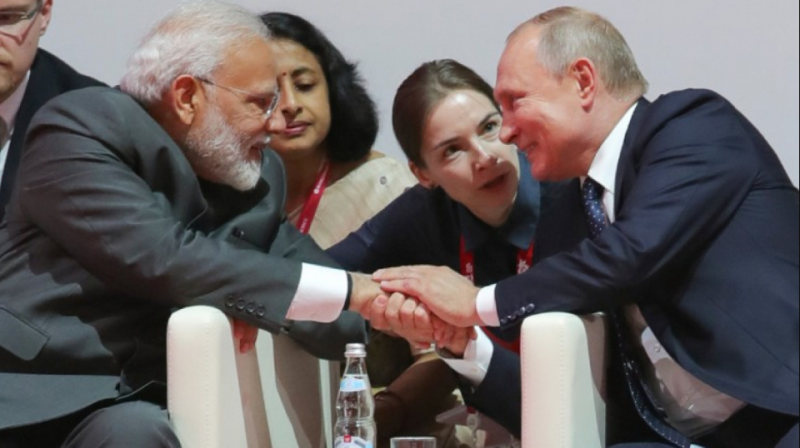
Ukraine: Economic sanctions will not stop Russia from fighting in Ukraine as long as secret economic deals involving crude exports support its military operations. According to information provided to India by the US Treasury Department, Russian crude was transported via high-sea transfers to a port in the Indian state of Gujarat, where it was refined before being taken to New York.
Sanctions against energy products of Russian origin are broken by transfer. According to Reserve Bank of India Deputy Governor Michael Patra, the refined production was put back on that ship, and it sailed without a destination. It received its destination while at sea, and after reaching its intended course, arrived in New York.
India has consistently opposed US efforts to bring justice to the people of Ukraine, brushing aside US concerns about the case. On resolutions in the UN Security Council and the General Assembly opposing the Russian invasion, New Delhi remained silent.
Unlike many other democracies, India has maintained relations by balancing neutrality on a razor's edge, while repeatedly insisting that it does so to protect its interests. However, observers are still characterizing it as a pro-Moscow stance.
About 5% of India's total imports are now made up of Russian oil. Compared to May, India's oil imports from Russia increased by 15.5%, while imports from conventional sources from Iraq and Saudi Arabia declined by 10.5% and 13.5%, respectively.
Despite importing 7.3% less Russian oil in July than in June, India has overtaken China, which made the most purchases last month. This may have been done in an attempt to quell international outrage.
India and the US have a complicated relationship as it chose non-alignment before joining the Soviet Union during the Cold War. At least six times, especially in relation to the Kashmir dispute, the Soviet Union refrained from voting or exercised its veto power in the Security Council in favor of India.
India signed a deal to buy the S-400 missile defense system from Russia despite strong opposition from Washington, and more than 60-70% of the Indian armed forces still use weapons made in Russia.
The dominance of the US dollar and the current international order are being questioned in forums such as the BRICS grouping, which includes Brazil, Russia, China and South Africa, and the Shanghai Cooperation Organisation, both of which have India as a major member.
In the light of Russia, India portrays its relationship with the US as one of strategic bilateralism. However, the lack of diplomatic openness and the current developments in the transshipment of Russian crude oil point to Russia's willingness to remain lenient.
India's stand is also a result of its concern that it will lose a two-front war against the more technologically advanced China and the nuclear-armed Pakistan. It sees Russia as a trusted ally, which it values for its continued diplomatic, economic and military support.
US Secretary of State Antony Blinken has expressed his desire for the US to be India's "partner of choice" in all areas in an effort to lure India away from Russia.
In an effort to support India against China, Washington is placing its bets with that country. The strategic planning of the Indo-Pacific region revolves around India. Because of its extensive coastline, the nation was invited to engage in quadrilateral security talks. It has also signed several agreements with the US, including the 2016 Logistics Exchange Memorandum of Agreement, the 2018 Communications Compatibility and Security Agreement and the 2020 Basic Exchange and Cooperation Agreement, all of which allow secure military communications and access to sensitive US . Hardware.
Meanwhile a two-front (cold) war is developing as China and Russia have interests that are increasingly similar in light of US intervention in Ukraine and Taiwan.
Western efforts to support Ukraine have been undermined by double-dipping by strategic allies such as India, where self-interest is placed above shared democratic principles. US allies may question the special treatment given to India, which could end Russia's opposition and play in the hands of Vladimir Putin.
The US may worry that New Delhi will back down from its geo-strategic commitments if it denounces India. This doctrine is invalid as long as China challenges US dominance and India's disputed northern borders are in immediate danger. India will always follow orders as it is well aware that it cannot compete with China, especially in light of the 2020 setback in the Galwan Valley of Ladakh.
While hashtags like #IStandWithPutin and #istandwithrussia were trending at the time of the invasion of Ukraine, it appears that some members of the Indian public still value their relationship with Russia. Every barrel of Russian crude that India imports. According to Ukraine's Foreign Minister Dmitry Kuleba, "there's a fair bit of Ukrainian blood in it." It remains to be seen how long India will stand up for its values and take the opportunity to go down in history against them.
UK and EU putting on a brave face why Ukraine still runs for becoming the Europe's cemetery
Ukraine and Russia have traded more accusations Concerning threats against nuclear plants
UK PM slams Russia's 'cultural vandalism' in Ukraine